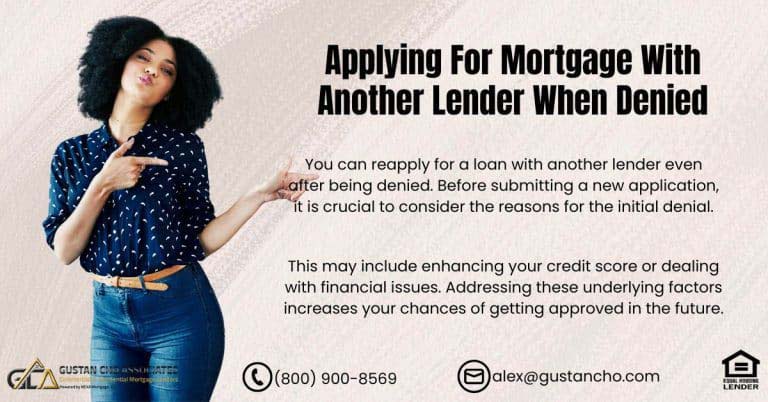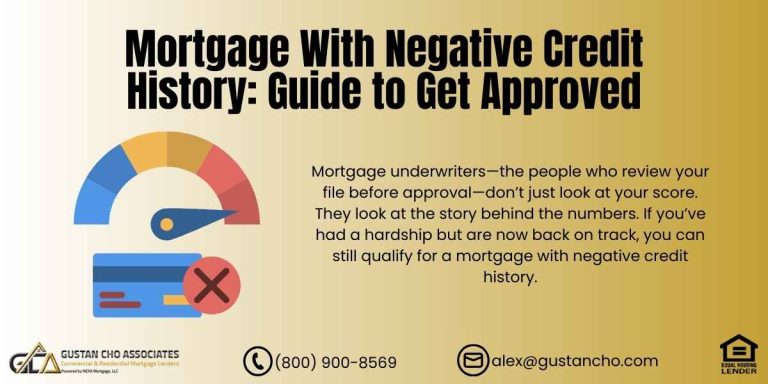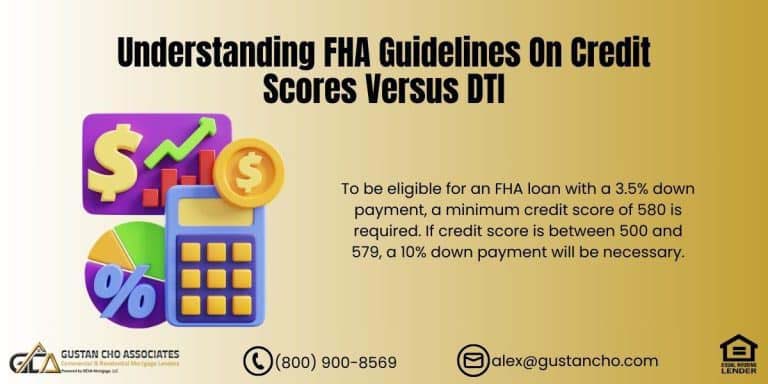In this article, we will cover and discuss the comparison between jumbo loan vs conventional loan programs and the differences in rates, terms, and LLPAs. Gustan Cho Associates has wholesale lending partners on traditional and conventional loan products. High-balance FHA jumbo loans need to meet HUD agency guidelines.
VA high-balance jumbo loans need to meet agency guidelines of the Veterans Administration. Jumbo loans are called non-conforming loans because they do not meet Fannie Mae and Freddie Mac agency guidelines.
Fact each individual lenders have different jumbo loan requirements, borrowers should do their own research and find out what type of jumbo loan program will be best for their particular situation. In the following paragraphs, we will cover the comparison between jumbo loan and conventional loans programs. We will also discuss non-QM and traditional jumbo loan programs.
The Difference Between Jumbo Loan Vs Conventional Loan Mortgages
There are no set standard guidelines on jumbo loans unless they are conforming jumbo loans or government high-balance jumbo loans. FHA jumbo loans have the same guidelines as a standard FHA loan in standard areas. However, lenders may have higher credit requirements on FHA high-balance jumbo loans called lender overlays. One of the newest traditional jumbo home loans Gustan Cho Associates offer is the 90% LTV jumbo mortgage. The minimum credit score required is 660 FICO and the maximum debt to income ratio cap is 50% DTI. Reserves are based on the borrower’s credit scores.
Jumbo Loan vs Conventional Loan Comparison | Mortgage Options In High-Cost Areas
As Americans, we understand that property values range dramatically across our nation. Areas such as San Francisco, California compared to Chicago, Illinois compared to Mobile, Alabama will show a wide range of property values. A home worth $100,000 in middle America may very well be worth close to $1 million in places such as Fairfax, Virginia. The cost of living is different throughout our nation as well. The Federal Housing Authority or FHA realizes these differences as well. There have been Conforming and FHA loan limits for a long time, even before the real estate crash of 2008. In this blog, we will detail what a high balance FHA area means and how to apply for a high balance FHA mortgage with Gustan Cho Associates
Speak With Our Loan Officer for Jumbo Loans
What Are FHA High-Balance Jumbo Loans
A high balance area is exactly what it sounds like. It is an area of the country where the property values are higher compared to the national average. Areas where the median home value exceeds the national average by 115%, are considered high balance areas. In these high balance areas, the FHA loan limit is considerably higher compared to the 2024 FHA baseline loan limit of $498,257.
Jumbo Loan vs Conventional Loan in High-Cost Counties
High balance FHA, and Conventional loans are capped at $1,149,825 in high-cost counties. Some of the areas include Los Angeles, San Diego, San Francisco, Denver, Miami, Naples, Atlanta, Hawaii, Chicago, Indianapolis, Kansas City, Minneapolis, Dallas, San Antonio, and Richmond. Please see the FHA LOAN LIMIT SEARCH TOOL to see if your area is included in the high balance realm. These high balance areas were created to help more Americans achieve homeownership nationwide.
Compare Jumbo Loan vs Jumbo Loan Mortgage Guidelines Determined
The data to determine what areas are considered high balance is taken directly from the Federal Housing Finance Agency or FHFA. They will compose an annual report that shows the House Price Index throughout the nation.
FHA and Conforming Loan Limits
Each year the loan limit will adjust depending on the state of the real estate economy. The conforming loan limit and FHA loan limit move up and down as home price indexes move up and down. Some areas of the nation have seen a slight dip and property values by others are still on the rise. The FHFA has a tough job creating the loan limits each year. Many Americans are forced into using JUMBO MORTGAGE LOANS to buy homes. A quick side note, there is currently not a loan limit for VA mortgages. most of our investors A VA home loan at $3 million. The Conventional loan limit set by FHFA is currently $766,550.
FHA High-Balance Jumbo Loans Mortgage Guidelines And Mortgage Process
What are the steps for obtaining a high-balance FHA mortgage? The steps are the same as any FHA mortgage. Just because you are in a high balance area, does not change the application process. The FHA requirements are the same for high balance areas. Meaning you still only need a 3.5% down payment with a credit score is 580 or above. If your scores are below 580, then you need a 10% down payment. Payment history and manual underwriting requirements are also the same. Please see our FHA MANUAL UNDERWRITING BLOG for more information.
Starting The Pre-Approval And Mortgage Process
Below is the documentation you should gather for your consultation phone call. The downside to a high balance FHA mortgage. Mortgage insurance is a requirement for every FHA mortgage product. Even if you put down 20%. If you’re looking to buy a home in a high-balance area, you need to be ready to pay extra mortgage insurance. Most FHA mortgage loans use a 3.5% down payment. In a high balance area with a 3.5% down payment, your monthly mortgage insurance will be 105 basis points compared to 85 basis points in a non-balanced area. This is an added cost to allow FHA to offer these mortgage loans. The mortgage insurance is paid directly to FHA and this mortgage insurance keeps the FHA operational. Click here to pre-approval for Jumbo Loans
High-Balance Mortgage Process During The Coronavirus Pandemic
FHA high balance during the COVID-19 coronavirus outbreak. Even during the pandemic, we are still offering FHA high-balance mortgage loans without any additional LENDER OVERLAYS. We still only require a 580 credit score or above for a 3.5% down payment and have the ability to go down to credit scores as low as 500 with a10% down payment. As mentioned earlier in this article, we offer manual underwriting on FHA high-balance loans. This may be the difference in buying a home today versus waiting 12 more months.
Compare Jumbo Loan vs Conventional Loan and Non-QM Mortgages
Homebuyers buying high-end homes and need to qualify for a mortgage higher than the conforming loan limit of $776,550 would need to go with non-conforming loans. Conventional loans have a jumbo high balance loan program in high-cost areas. The maximum high-balance conforming jumbo loan limit is $1,149,250. In order to qualify for a 5% down payment conforming high-balance jumbo loan, the property needs to be in high-cost areas. Self-employed buyers with do not need to declare much income due to reimbursed expenses can qualify for Jumbo non-QM loans. Non-QM loans are alternative jumbo loan programs for buyers need a niche product not available with traditional conforming loans.
High-Balance FHA and VA Jumbo Loan vs Conventional Loan in High-Cost Areas
In order to qualify for a high balance conforming or high-cost FHA loan, the property needs to be in a county that has been designated as high-cost. Many counties in the United States are classified as high-cost areas. California has the highest number of high-cost counties out of any area in the United States. High-balance loans have significantly higher loan limits than traditional areas.
Rising Home Prices With No Signs Of A Housing Correction
Home prices have been increasing with no signs of correction since 2012. Many areas in California, Florida, Mississippi, Kentucky, New Jersey, Pennsylvania, Colorado, Michigan, Georgia, Indiana, and Illinois, have seen double-digit price appreciation. Home values in these areas, as well as most states, have been increasing despite the highest mortgage rates in 10 years. Homebuilders are enjoying record sales and revenues. FHFA has increased conforming loan limits for 2024 and is now capped at $776,550 FHFA has increased conforming loan limits for three consecutive years in a row due to rising home values. HUD followed in FHFA’s footsteps and raised FHA Loan Limits 6 years in a row due to rising home values. In this article, we will cover high balance conforming and jumbo mortgage lending guidelines.
Qualify for FHA Loans, click here
What is Mortgage Rate Comparison Between High-Balance Jumbo Loan vs Conventional Loan
There are areas in the United States where home prices are substantially higher. Many counties in California are considered high-cost areas. There can be big pricing differences when it comes to mortgage rates on high-balance jumbo loan vs conventional loan rate comparisons in high-cost areas. With the FHFA raising conforming loan limits for 2024. High Balance and Conforming Mortgage Loan Limits have increased as well. High Balance Conforming and FHA Jumbo Mortgage Loan Limits rose to $1,149,250. VA Jumbo loans in high-cost areas no longer have a maximum loan limit. However, VA loans no longer have a maximum loan limit.
Traditional Versus Non-Traditional Jumbo Mortgages
Gustan Cho Associates offers traditional and non-QM Jumbo Mortgages. In general and as a right-hand rule, Jumbo loans start when the conforming loan limit ends. High-balance conforming loans are loans that are higher than the traditional standard conforming loan limit of $776,550. Any loans higher than $776,550 are considered jumbo loans. Jumbo FHA and Jumbo VA loans are loans higher than $776,550. They are called high-balance government loans. Any conforming loans higher than $776,550 are called high-balance conventional loans. Traditional and NON-QM Jumbo loans are not backed by Freddie Mac or Fannie Mae.
Benefits Of High Balance Conforming Loans
There are many counties in the U.S. that are considered high-cost areas. There are many U.S. counties that are considered high-cost areas. Borrowers in high-cost areas can qualify for high-balance conforming loans with conventional mortgage rates. With just a 3% to 5%, down payment, mortgage insurance is required on conventional loans. Typically, buying out mortgage insurance is cheaper than lender-paid mortgage insurance. Buying out private mortgage insurance with an upfront premium requires no annual mortgage insurance is possible and is called lender-paid mortgage insurance (LPMI). High-balance conforming loans are available for primary and secondary homes that are eligible. Refinance cash-out options available up to 80% loan-to-value on high balance conforming loans.
Jumbo Loan vs Conventional Loan Morgage Guidelines by Lenders
Gustan Cho Associates offers various traditional and non-traditional Jumbo Loan Programs. Jumbo Loans are also referred to as non-conforming loans. This is because they do not conform to Fannie Mae or Freddie Mac Guidelines. Any home loan that is higher than conforming loan limits, including high balance conventional loans, is referred to as a Jumbo loan. Gustan Cho Associates has some great NON-QM Jumbo Mortgage Loans for higher-end homebuyers:
- Closing in 30 days or less
- 10% down payment NON-QM Jumbo Loans
- 90% CLTV Jumbo Mortgage Loan Program with a piggyback second mortgage
- Jumbo Loans with credit scores as low as 500 FICO
- One to four units
- No private mortgage insurance
- Jumbo Loans with loan limits up to $3 million
- Bank statement loan program for self-employed borrowers
- Asset depletion loan programs
Qualify Today on Your High Balance Conforming and Jumbo Mortgage With Gustan Cho Associates

Jumbo Lenders With Mulitple Jumbo Mortgage Options
Borrowers can contact us at Gustan Cho Associates Mortgage Group at 800-900-8569 or text us for a faster response for more information. Or email us at gcho@gustancho.com. Gustan Cho Associates is available 7 days a week, on evenings, weekends, and holidays. Gustan Cho Associates is known nationally for not having any lender overlays on government and conventional loans. We also have dozens of wholesale lending partnerships with non-QM wholesale lenders. Over 80% of our borrowers are folks who could not qualify at other lenders. When borrowers get denied by other lenders, they come to us at Gustan Cho Associates to get qualified and close on their home loans.
Non-QM Jumbo Loans for Self-Employed Borrowers
This Article Is About Non-QM Jumbo Mortgages For Self Employed Borrowers. Government and conventional loans have a maximum loan limit. The maximum loan limit depends on the individual loan program. Gustan Cho Associates now offers Non-QM jumbo mortgages for self-employed borrowers with credit scores as low as 500 FICO.
Jumbo Loan vs Conventional Loan For Self-Employed Borrowers
No income tax returns are required. A 10% to 30% down payment on a home purchase is required on non-QM and alternative financing loan programs. Besides non-QM loans, Gustan Cho Associates offers traditional jumbo loans with a 10% down payment and credit scores down to 660 FICO. The debt to income ratio is capped at 50% on the 90% LTV jumbo loan programs.
Down Payment Requirements on Jumbo Loan vs Conventional Loan on 30-Year Fixed-Rate Mortgage
The amount of down payment required depends on borrowers’ credit scores and other factors. Non-QM lenders calculate income on bank statement loans by averaging 12 months of bank statement deposits. That monthly average is the borrower’s monthly income. Income tax returns are not required. Withdrawals do not matter and do not count. Up to 50% debt to income ratios. Now self-employed borrowers who have a lot of write-offs on their tax returns can qualify for Non-QM jumbo mortgages with no tax returns. In this article, we will cover and discuss Non-QM Jumbo Mortgages For Self-Employed Borrowers.
Traditional and High-Balance Jumbo Loan vs Conventional Loan Comparisons on Down Payment and Rates
Conventional Loans and Government Loans have maximum loan limits. Any loan amount exceeding loan limits is called non-conforming loans or jumbo loans. For example, FHA standard loan limits are capped at $498,257 unless the property is located in a high-cost area. For example, FHA loan limits in Sarasota, Tampa, and surrounding areas are capped at $498,257 whereas areas in Palm Beach County, Miami-Dade County are capped at $621,000.
Jumbo Loan vs Conventional Loan Limits in Standard and High-Cost Areas
The higher FHA loan limits are set by HUD, the parent of FHA, in counties that are classified as high-cost areas. For conventional loans, the Federal Home Loan Mortgage Corporation, Freddie Mac, and the Federal National Mortgage Association regulate the home loan industry. FHFA, The Federal Housing Finance Agency, is the governmental agency that regulates Fannie Mae and Freddie Mac and sets conforming loan limits. Fannie Mae and Freddie Mac regulate conforming guidelines and set maximum lending limits. Today, the maximum conventional loan limits are capped at $776,550. In most counties in the United States. Standards set by Fannie Mae and Freddie Mac are secured by FHFA and are called conforming loans. Any mortgage loans that fall outside the conforming lending limits are classified as non-conforming loans or JUMBO MORTGAGES.
What Are Jumbo Loan vs Conventional Loan Mortgages
Jumbo Mortgages are residential mortgage loans that fall over the maximum lending limits set by FHFA. It is called non-conforming loans since it does not conform to the government’s maximum lending limit. Any mortgage loan over the maximum lending conforming limit of $776,550 is considered a Jumbo mortgage. Jumbo mortgages normally have higher interest rates.
Comparing Requirement Jumbo Loan vs Conventional Loan For Mortgage Approval
Qualifications are much tougher than conforming loans. Gustan Cho Associates now offers Jumbo Loans with a 10% down payment. The minimum credit score required is 660 FICO. The maximum debt to income ratio to qualify for a 90% LTV Jumbo Mortgage is 50%. This is a traditional jumbo loan program and NOT a non-QM loan product. Get Jumbo loans with 10% down payment, click here
How Lenders Jumbo Loan vs Conventional Loan Appraisals
To get approved for Jumbo mortgages, the home needs to appraise. The appraiser needs comparable sales of the higher-priced homes. Home Buyers can not have a white elephant where most of the homeowners in the neighborhood have standard conforming loans because it will be difficult to get comparable sales. If the house is the only high-end home that is larger and more expensive than the norm, it will be difficult for the appraiser to get comparable sales.
Comparing Jumbo Loan vs Conventional Loan Down Payment Requirements
Most traditional lenders require a 20% down payment on jumbo mortgages. Gustan Cho Associates offers a 10% down payment jumbo loan program for prime borrowers. Most jumbo lenders require credit scores of 700 or higher. Maximum debt to income ratios is capped at 50%. Jumbo borrowers who are seeking the best available interest rates need credit scores of 740 FICO or higher and a loan to value at 75%.
Mortgage Rates Comparison Jumbo Loan vs Conventional Loan
Jumbo mortgage interest rates are normally 0.50% higher than regular conforming interest rates. Conventional and FHA high-balance loans require lower down payments. Down payment requirements follow agency down payment requirements. 5% down payment on conventional high-balance conventional loans and 3.5 down payment on FHA high-balance jumbo loans.
Jumbo Loan vs Conventional Loan Limit Comparison For 2024 in Standard and High-Cost Counties
Conforming loan limits set by Fannie Mae and Freddie Mac for 2024 are capped at $776,550 in counties that are not classified as high-cost areas. Two-unit buildings, the maximum conforming limit is capped at $981,500 and $1,472,250. For borrowers of three-unit buildings, the maximum conforming limit is capped at $1,186,350 and $1,779,525 in high-cost areas. The maximum amount for a 4-unit property for a conforming loan is $1,474,400 and $2,211,600 in high-cost areas. Conforming limits are capped at higher amounts for high-cost states Hawaii, Alaska, Guam, and the United States Virgin Islands. the loan limit is $1,149,250 for one-unit properties. Two to four-unit multifamily properties in high-cost areas range from $1,472,259 to $2,211,600.
Non-QM Mortgages Versus Jumbo Mortgage Lending Guidelines
Non-QM Mortgages have much more lenient lending guidelines than traditional jumbo loans. Jumbo Mortgages have tougher mortgage lending criteria than conventional mortgage loans. There is no waiting period after foreclosure, deed in lieu of foreclosure, or short sale to qualify for NON-QM Jumbo Mortgages. Borrowers with 620 credit scores can qualify for Non-QM jumbo mortgages whereas traditional jumbo lenders want 700 credit scores. 10% to 20% down payment is required on jumbo Non-QM jumbo mortgages where most traditional jumbo lenders want a 10% to 25% down payment. There is no mortgage insurance required on jumbo Non-QM jumbo mortgages even with higher than 80% loan to value.
Mortgage Rates on Non-QM vs Jumbo Loan vs Conventional Loan Comparison
Interest rates on Non-QM Jumbo mortgages are slightly higher than traditional jumbo loans. Most Jumbo mortgage lenders require a minimum of 20% to 25% down payment on a home purchase. To get the best Jumbo mortgage interest rates, the Jumbo mortgage loan borrower should have at least a 740 credit score, have a 25% down payment, have no more than a 40% debt to income ratio, and have reserves on traditional jumbo loans. However, NON-QM Jumbo Mortgages with lower credit scores. 10% to 20% down payment. 50% debt to income ratio caps on Non-QM jumbo mortgages. The down payment requirements depend on the borrower’s credit scores. Qualify forJumbo loans with 740 credit score, click here
Special NON-QM Jumbo Mortgages For Self Employed Borrowers
We now offer a 10% down payment, and 90% loan to value, with no private mortgage insurance required to qualified borrowers. Non-QM Mortgages for self-employed borrowers is a special jumbo loan program where no tax returns are required. 12 months of bank statement deposits are averaged and the monthly deposits are used as monthly income. Borrowers can use personal and/or business bank statements. 100% of deposits can be used on personal bank statements. 50% of deposits are used on business bank statements. Needs to be from the same bank account and multiple bank statements are not allowed. Overdrafts are not allowed.
Minimum Credit Scores Down To 500 FICO on Non-QM Loans
To qualify, the Jumbo mortgage loan borrower needs to have a minimum credit score of 500: The borrower’s debt to income ratios cannot be greater than 50% DTI. Private mortgage insurance is not required on Non-QM jumbo mortgages with higher than 80% LTV. The Jumbo mortgage lender wants to see a strong credit borrower with ample reserves and assets.
80/10/10 Mortgage Loan Programs For Jumbo Home Buyers
An alternative to Jumbo mortgage loans is the 80/10/10 mortgage loan program. This is where the home buyer who wants to purchase a higher-priced home that exceeds the $776,550 conforming limit caps can get a first conventional loan and get a second mortgage. As long as the home buyer can put a 10% down payment and get a $776,550 conforming loan approved, the difference can be funded from a second mortgage. However, most second mortgage lenders want a 700 credit score and a debt to income ratio not exceeding 43%. Home Buyers interested in qualifying for NON-QM Jumbo Mortgages, please contact us at Gustan Cho Associates at 800-900-8569 or text us for a faster response. Or email us at gcho@gustancho.com. The team at Gustan Cho Associates is available 7 days a week, on evenings, weekends, and holidays.
Speak with us even in holidays and weekends, click here









